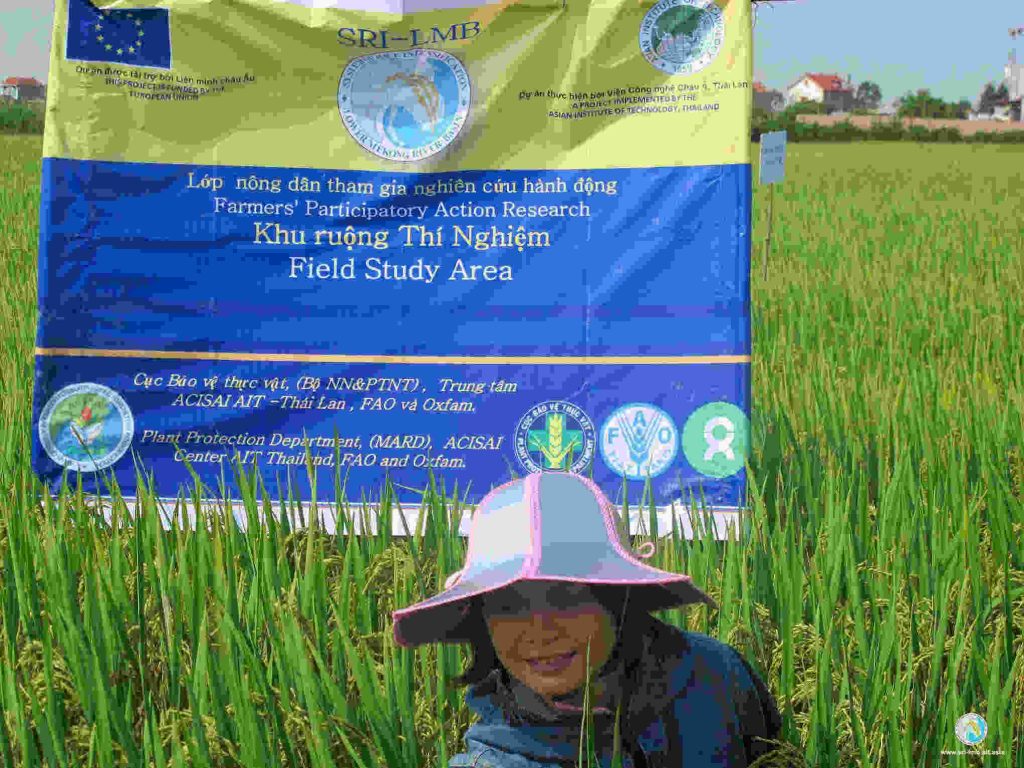BACKGROUND
Approximately 22 million hectares of land area are under rice cultivation in the Lower Mekong Basin region, with about 90% of this area rainfed, lacking reliable irrigation facilities. Smallholder farmers predominate in the region but they are able to produce much less than is possible due to poor access to new ideas, depletion of the natural resource base and constraining institutional and policy environments. This has created a vicious cycle of low productivity, pervasive poverty, and severe food insecurity.
The potential for innovative agro-ecologically-based crop management practices to address these inter-linked issues has generated considerable interest, especially in System of Rice Intensifications (SRI). System of Rice Intensification (SRI) is an emerging alternative technology to conventional rice cultivation techniques that instills a social dimension to farming to produce healthy and profitable crops using less water and less seed, and through skillful management of plants, soils, water and nutrients. SRI methods have gained significant momentum among farmers in a wide variety of agroecosystems and have been demonstrated to be effective now in 52 countries, with considerable successes mainly in irrigated area.
THE PROJECT
The suite of management practices that characterize SRI is being evaluated and refined in a regional project which supports farmers-led research for the development of location-specific applications in rainfed areas of the LMB countries, Cambodia, Laos, Vietnam and Thailand. Financed by the European Union, the Project “SRI-LMB” implementation is led by the Asian Center of Innovation for Sustainable Agricultural Intensification (ACISAI). Partners include the Food and Agriculture Organization of the United Nations, Oxfam America, national ministries and local-level agencies in the four countries as well as universities and civil society organizations. Experts at the SRI-Rice Center at Cornell University and the University of Queensland cooperate with the project. The project seeks to stimulate local innovation to sustainably improve agricultural productivity and food security. The economic well-being of the household is being addressed accordingly. The existing government policies is being studied within the context of sustainable and climate resilient food secure rainfed smallholder system and evidence-based suggestion for a better set of policies is being generated through a participatory consultation process closely working with all relevant stakeholders including policy makers in the countries.
STAKEHOLDERS AND TARGET BENEFICIARIES
The project has many stakeholders since it has the potential of wide-ranging impacts on the environment and rural livelihood. Through action, it links all three core activities of the institute, Research, Education and Outreach. The primary stakeholders are extensions workers, scientist, government, non-government and development organizations and academic and research institutions. The target beneficiaries are male and female farmers as well as national policy makers.
OUTCOME
Sustained crop yields and productivity and enhanced resilience to changing and variable climatic conditions among rainfed smallholder farmers and farming communities in LMB, specifically contributing to the United Nation’s Sustainable Development Goals, the SDGs, and the eradication of extreme poverty and in particular to the second SDG: ending hunger, achieving food security, improving nutrition, and promoting sustainable agriculture.
ACTIVITIES
The resilience of rainfed smallhlder farmers (including landless and women) and farming communities confronting climate change and other challenges is being enhanced by stimulating and supporting local innovation through farmers’ participatory action/field research (FPAR) and by collaboration among agriculture sector organizations working on enhancing food security and policy dialogue. Functional networks and existing relationships among implementing partners and counterparts at local, national and regional levels is being strengthened for coordinated knowledge generation and action. Documentation of the results and sharing it with the immediate and community at large through an inclusive participatory process from local to regional level are at the core of the project.
PROJECT INFORMATION
Project Type: Grant
Funding Scheme: Europe Aid “2009-2010 Global Programme on Agriculture Research for Development-Component 1- Research and Technology
Start Date: 01 January 2013
Project PI: Dr. Abha Mishra
Total cost of Acton: 3.4 million Euro
Project website: http://www.sri-lmb.ait.asia/
Contact at AIT Contact at the EU Delegation
Dr. Abha Mishra Mr. Van Doorn Seth
Director ACISAI EU Press and information Advisor
Ph No: +66-2-524-5826 Delegation of the European Union to Thailand
Mobile: +6685-323-9249 E-mail: Seth.VAN-DOORN@eeas.europa.eu
Email: abhamishra@ait.asia

